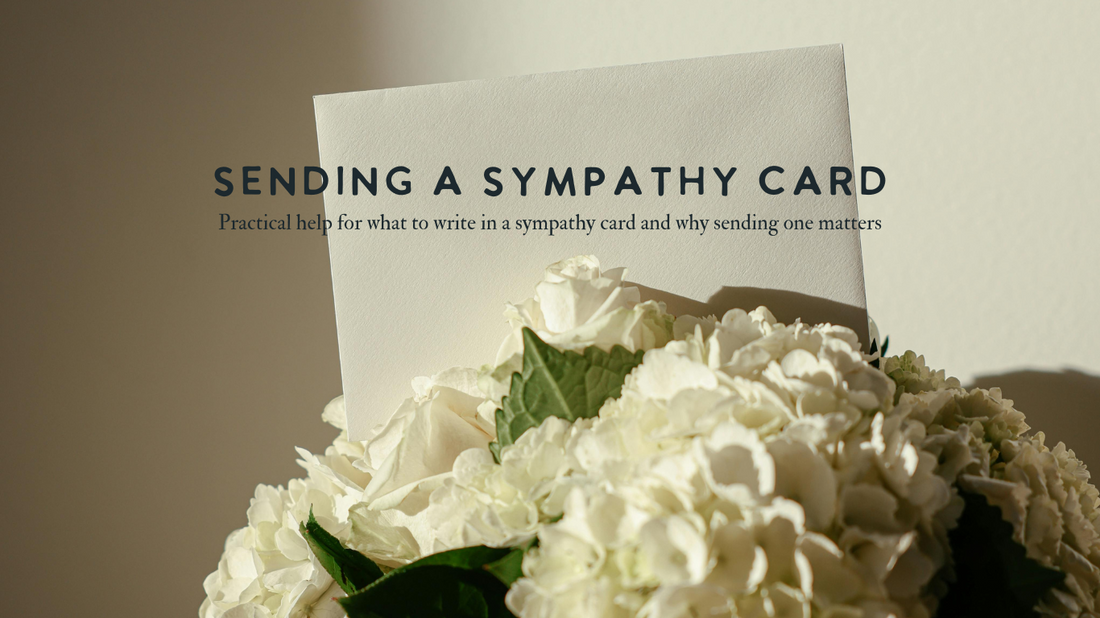
What to Write in a Sympathy Card
Share
Sending a Sympathy Card When Someone Is Grieving
It can be hard to know what to say or do when you want to support someone after a loss. There are many good ways to show care: listening, bringing a meal, offering lifts, or simply sitting beside them. This post focuses on one small but powerful act you can do right away: a handwritten card. It delivers your presence gently, without asking for a reply, and it can be read again on the hard days.

Why sending a sympathy card matters
Losing someone dear is disorienting. A simple card, handwritten, honest, and kind, can cut through the noise and say I see you. Your grief matters. I am with you. This guide offers practical help for what to write in a sympathy card and why sending one matters.
- It is tangible care. In a season when everything feels uncertain, a card can be held, reread, and kept.
- It arrives quietly. Unlike a call or a visit, a card does not demand energy to respond.
- It honours a life. Naming the person who died says their life mattered and still matters.
- It bridges distance. When you are far away or cannot find the words in person, a card carries them for you.
Tip: Send a card even if time has passed. Sympathy is never late. You can write, I am sorry this note has taken me a while. You have been on my heart.
What to write in a sympathy card
Keep your message short, sincere, and specific. You do not need perfect words, just real ones.
1. Acknowledge the loss by name.
"I am so sorry to hear about your dad, John."
2. Say something kind or specific about the person who died.
"I will always remember her laugh at the summer picnic."
3. Offer care or support, concrete if possible.
"Whenever it’s helpful, I can pick up groceries or run an errand"
4. Close gently.
"With love," "Holding you in my thoughts," or faith-based "praying for you at this difficult time".
Things to avoid: platitudes like "at least...", explanations for the loss, comparing grief, or rushing someone to feel better.
Practical writing tips
- Use the person’s name, both the bereaved and the one who died. It is a gift to see their names written.
- Keep it legible. Print if your handwriting is tiny. White space helps a tired brain.
- Include a memory. One small story can mean the world.
- Offer one specific help eg. “Keep this for when you’re ready: I’m here to help with school runs or simple tasks". “I’m always up for a quiet walk or a cup of tea when it suits you—no rush". “If admin gets heavy, I can proofread a note or make a call when you want.”
-
Do not expect a reply, you can add, "No need to respond."
- Timing: send as soon as you can.
What not to say, and what to try instead
"At least they lived a long life." → "I am grateful for their years, and I am so sorry you have to say goodbye."
"Everything happens for a reason." → "This is so hard. I am here with you."
"They are in a better place." unless you know this comforts them → "I am holding you in my heart."
Comparisons like "I know exactly how you feel" → "I cannot imagine, but I care deeply."
Envelope and addressing tips
- If you are unsure how to address, use the bereaved person’s full name on the envelope.
- Inside, include the name of the person who died, for example, "your dad, Martin".
- If writing to a family, you can address to "The Müller Family" and then write to the individuals inside.
For friends and family far away
- Add a photo memory to your card or share a brief story that includes their loved one by name.
- Send practical help from a distance: arrange local meal delivery, book a cleaner, or send a grocery voucher.
- Coordinate helpers nearby: ask a mutual friend to check in, organise a lift rota, or set up a meal train.
- Offer time-specific support you can actually do: a weekly video call, reading bedtime stories over video for the kids, or a regular walk-and-talk call.
- Share a voice note instead of asking them to talk. Hearing a familiar voice can be comforting without needing to reply.
- Post a small care package: soft socks, tea, tissues, a candle, and your card.
- Make a donation in their loved one’s name to a cause that fits the family.
- Help with admin from afar: proofreading emails, filling in simple forms, or booking appointments they request.
- Set calendar reminders for the one month mark, birthdays, and the death anniversary, then send a short check in message.
- If you are visiting later, say so and offer one clear plan you can take off their plate when you arrive.
After the card: gentle follow ups
Set a reminder to check in. Grief is heavy long after the flowers fade.
- One month later: "Thinking of you today. How are you doing?"
- On the birthday or anniversary: "Lighting a candle for Nora today with you."
- On big days: first day back at work, school events, and other milestones.
Need a simple sympathy card?
Prefer an understated design with room for your words? Explore the Deer & Sparrow sympathy card, based on an original ink painting. It is blank inside to give quiet space for your message.

Final thought
You do not have to fix anything. Your presence on a small square of paper can be a lifeline. Write simply, write soon, and let your care be felt.
If you prefer understated, nature-inspired designs that leave room for your words, choose a simple card and let your message take centre stage.
- - -
Sample Sympathy messages by situation
A few ideas for what to write, depending on how well you know the person and their situation...
For a close friend
I am heartbroken with you about Daniel. I will miss his kindness and the way he always remembered everyone’s favourite tea. Holding you close.
For a colleague
I am so sorry to hear about your grandfather, Mr. Keller. Wishing you time and space in the days ahead. Thinking of you.
For a neighbour or acquaintance
We were sad to hear about your sister, Anna. Please accept our deepest sympathy. Your family is in our thoughts.
For miscarriage or baby loss
There are no easy words. I am so sorry for the loss of your baby. Your grief is real and valid, and you are not alone.
For loss of a partner or spouse
I am deeply sorry about the death of your beloved Luca. Your love for each other was evident to everyone who knew you. With heartfelt sympathy.
For loss of a pet
I am sorry about Milo. He brought so much joy. Holding you in my thoughts.
Faith-friendly wording
Praying for peace and comfort as you mourn Sophie. May you sense God’s nearness today and in the weeks to come.
Secular wording
Thinking of you as you navigate these hard days. You are not alone.
For the loss of a parent
I am so sorry about your mum, Elena. She was deeply loved. Wishing you gentle days and moments of rest.
For the loss of a child
There are no words big enough. Remembering Noah with you today and always, and holding you in my heart.
For the loss of a sibling
I am heartbroken to hear about your brother, Marco. I will miss his humour. With deepest sympathy.
For the loss of a grandparent
I am sorry for your loss. Your Nonna’s warmth lives on in the stories you have shared. Thinking of you.
For a colleague or manager
I am sorry you are going through this, Priya. Wishing you the time you need. With sympathy.
For a client or customer
On behalf of our team, please accept our condolences on the loss of your father. Our thoughts are with you at this time.
For a teacher, coach, or mentor
Thank you for all you have poured into our family. We are so sorry for your loss and are holding you in our thoughts.
For a member of your faith community (use if welcome)
Praying for comfort as you grieve Daniel. May hope and peace meet you in the days ahead.
